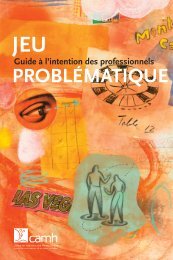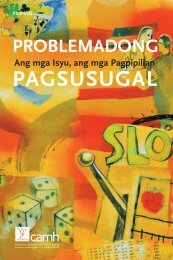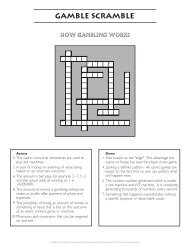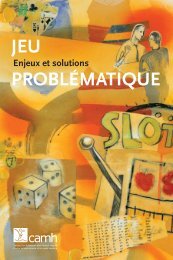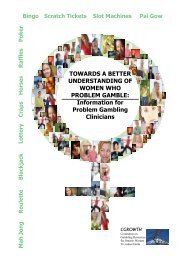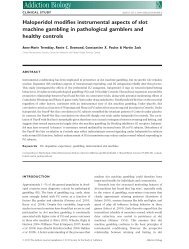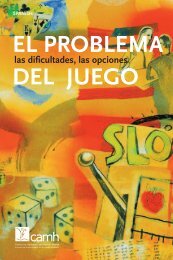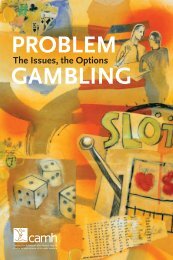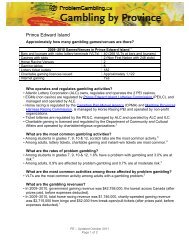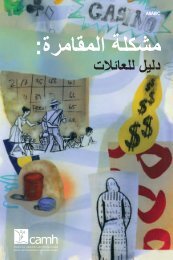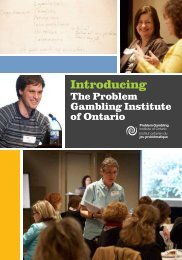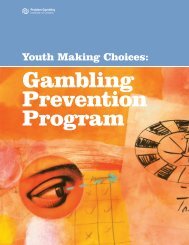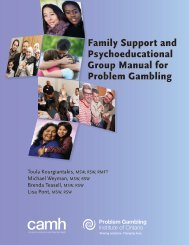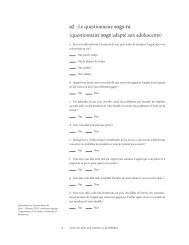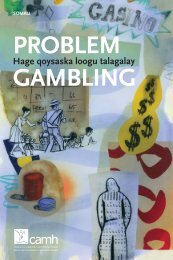Probability, Random Events, and the Mathematics of Gambling
Probability, Random Events, and the Mathematics of Gambling
Probability, Random Events, and the Mathematics of Gambling
Create successful ePaper yourself
Turn your PDF publications into a flip-book with our unique Google optimized e-Paper software.
games to divine <strong>the</strong> will <strong>of</strong> <strong>the</strong> gods (Gabriel, 2003). Related to this is <strong>the</strong> notion that<br />
everything happens for a reason <strong>and</strong> thus r<strong>and</strong>om outcomes must contain a message.<br />
Some people who gamble believe that <strong>the</strong>re is no such thing as a r<strong>and</strong>om event <strong>and</strong> that <strong>the</strong>y<br />
can <strong>the</strong>refore figure out how to win. In a sense, <strong>the</strong>y are correct in that all r<strong>and</strong>om events are<br />
<strong>the</strong> result <strong>of</strong> physical forces or ma<strong>the</strong>matical algorithms. In practice, however, <strong>the</strong>y are<br />
completely wrong. A r<strong>and</strong>om event occurs when a difficult problem (e.g., controlling <strong>the</strong><br />
exact speed, movement <strong>and</strong> height <strong>of</strong> a dice throw) is combined with a complex process (e.g.,<br />
<strong>the</strong> dice rolling across a table <strong>and</strong> bouncing against a bumper on its far side). This<br />
combination leads to complete uncertainty as to what will actually occur.<br />
<strong>R<strong>and</strong>om</strong>ness is a ma<strong>the</strong>matical concept used to model <strong>the</strong> real world. The fact that r<strong>and</strong>om<br />
events can be described ma<strong>the</strong>matically does not mean <strong>the</strong>y are deterministic, nor does it<br />
mean <strong>the</strong>y are non-deterministic—<strong>the</strong>ir predictability is irrelevant. To call something r<strong>and</strong>om<br />
simply means that <strong>the</strong> observer does not know what <strong>the</strong> outcome will be (De Finetti, 1990).<br />
Most events that we think r<strong>and</strong>om are, in fact, deterministic in nature, but so complex that<br />
<strong>the</strong>y are impossible to predict. For example, where a ball l<strong>and</strong>s on a roulette wheel is directly<br />
related to <strong>the</strong> amount <strong>of</strong> force used to throw <strong>the</strong> ball <strong>and</strong> <strong>the</strong> speed <strong>of</strong> <strong>the</strong> spinning wheel. In<br />
practice, however, it is impossible to predict where <strong>the</strong> ball will l<strong>and</strong>. The probability <strong>of</strong><br />
different r<strong>and</strong>om events is not equal; some events are more likely to occur than o<strong>the</strong>rs. This is<br />
especially true when we consider <strong>the</strong> chances <strong>of</strong> joint events (e.g., three win symbols showing<br />
on a slot machine) or <strong>the</strong> chance <strong>of</strong> one event compared to all o<strong>the</strong>r events (e.g., holding a<br />
winning vs. a losing lottery ticket). Taken toge<strong>the</strong>r, however, <strong>the</strong> probabilities <strong>of</strong> all possible<br />
events must add up to 100% <strong>and</strong> each <strong>of</strong> those percentage points is equally likely.<br />
Unfortunately, many people hold erroneous ideas about <strong>the</strong> nature <strong>of</strong> r<strong>and</strong>om chance. The<br />
best way to get a feeling for what lies at <strong>the</strong> root <strong>of</strong> <strong>the</strong>se misconceptions is to explore <strong>the</strong><br />
basic, interrelated concepts upon which most gambling activity depends: probability <strong>and</strong><br />
r<strong>and</strong>omness. The goal <strong>of</strong> this chapter is to help <strong>the</strong> reader underst<strong>and</strong> probability well enough<br />
to identify <strong>the</strong> errors in thinking <strong>of</strong> people with a gambling problem <strong>and</strong> to help <strong>the</strong> <strong>the</strong>rapist<br />
communicate with <strong>the</strong>m. Misunderst<strong>and</strong>ing probability may not be <strong>the</strong> main cause <strong>of</strong> an<br />
individual’s gambling problem. Turner, Littman-Sharp <strong>and</strong> Zangeneh, (2006) found that<br />
problematic gambling was more strongly related to depression, stressful life experiences <strong>and</strong> a<br />
reliance on escape to cope with stress than it was to erroneous beliefs. Correcting<br />
misconceptions, however, may be an important part <strong>of</strong> relapse prevention. If a client really<br />
believes that it is possible to beat <strong>the</strong> odds, <strong>the</strong> odds are that he or she will try. In addition, <strong>the</strong><br />
use <strong>of</strong> escape methods to deal with stress is significantly correlated with erroneous beliefs,<br />
suggesting that using gambling to escape negative moods may be directly tied to <strong>the</strong> belief<br />
3



